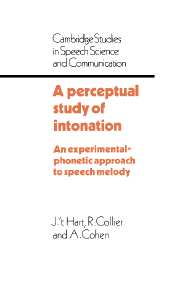Preface
Published online by Cambridge University Press: 04 May 2010
Summary
Ever since the establishment, in 1957, of the Institute for Perception Research (IPO) in Eindhoven, The Netherlands, one of the main fields of interest in the research programme has been psychoacoustics. More particularly, the study of the perception of pitch in complex signals predominated right from the beginning. When, in 1959, a start was made with phonetic research, it was not immediately clear on which of the many potential subjects the efforts should be concentrated. After having attended the Fourth International Congress of Phonetic Sciences in Helsinki, in 1961, we concluded that, in those days, relatively little attention was paid to prosodic phenomena in general, and to pitch in speech in particular. Gradually, we began to appreciate that trying to explore the perception of pitch in speech not only could contribute to fill a gap in phonetic research, but also would link up our phonetic activities with the already existing psychoacoustic tradition at the Institute. And so, we decided to devote part of the work of the then small group of phoneticians at IPO to a perceptual study of intonation. In anticipation of the complication that speech pitch is highly dynamic, our first aim was to develop a method that would enable us to unravel systematically recurring characteristics of the various possible melodic lines in spoken language. This implied that, for the time being, an exploration of the linguistic substratum was considered premature.
- Type
- Chapter
- Information
- A Perceptual Study of IntonationAn Experimental-Phonetic Approach to Speech Melody, pp. xiii - xivPublisher: Cambridge University PressPrint publication year: 1990

